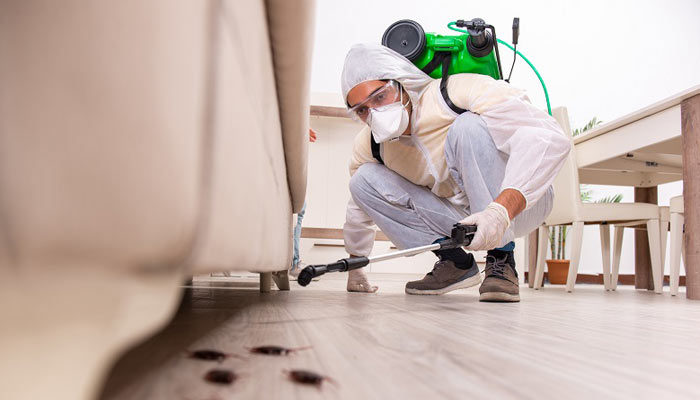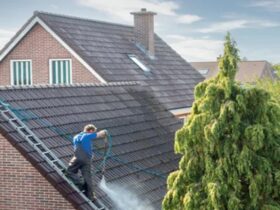Welcome to the essential guide to pest control services. In this comprehensive article, we will explore everything you need to know about safeguarding your property from common household pests. From understanding the different types of pests to choosing the right pest control company, implementing safe and effective DIY methods, and maintaining a pest-free environment, we have got you covered. So let’s dive in and start protecting your home from unwanted intruders.
- Understanding Common Household Pests
Before we can effectively tackle pest control, it is crucial to understand the common household pests that may invade our homes. By familiarizing ourselves with their characteristics and behavior, we can take appropriate measures to prevent infestations and deal with them effectively if they occur.
Identifying and Dealing with Cockroaches
Cockroaches are one of the most common and resilient pests found in homes. These nocturnal insects thrive in warm and dark environments, making our kitchens and bathrooms their favorite spots. Not only are they a nuisance, but they can also pose health risks by spreading bacteria and allergens. To effectively deal with a cockroach infestation, it is essential to identify their hiding places, eliminate food sources, and use targeted treatments such as baits and insecticides.
Tackling Pesky Ant Infestations
Ants, with their small size and incredible organizational skills, can quickly become a nuisance in our homes. These tiny creatures are attracted to food sources and can form large colonies within our walls or furniture. To tackle an ant infestation, it is crucial to locate and eliminate their entry points, disrupt their pheromone trails, and use ant baits or repellents strategically.
Banishing Annoying Mosquitoes and Flies
Mosquitoes and flies not only disrupt our peace with their constant buzzing but also pose health risks by transmitting diseases. These flying pests breed in stagnant water or decaying organic matter and can quickly multiply if not addressed promptly. To banish mosquitoes and flies, it is crucial to eliminate their breeding grounds, use repellents, install screens on windows, and consider outdoor treatments such as fogging.
- Choosing the Right Pest Control Company
When faced with a severe infestation or an inability to deal with pests on your own, it is essential to choose the right pest control company. Here are some factors to consider before hiring a professional service.
Factors to Consider Before Hiring a Pest Control Service
Before hiring a pest control service, it is crucial to consider factors such as the company’s reputation, experience, and customer reviews. Additionally, assessing their pest control methods, guarantees, and pricing structures will help you make an informed decision. It is also advisable to inquire about their certifications and licenses to ensure they comply with industry standards and regulations.
Comparing Different Pest Control Techniques
There are several pest control techniques available, ranging from chemical-based methods to more eco-friendly alternatives. Understanding and comparing these techniques will help you choose the most suitable approach for your specific pest problem. It is essential to consider factors such as effectiveness, safety, and long-term sustainability when evaluating different pest control techniques.
Importance of Checking a Company’s License and Insurance
When hiring a pest control company, it is crucial to ensure they have the necessary licenses and insurance. A licensed company indicates that they have met specific criteria and adhere to industry standards. Insurance coverage provides protection in case of accidental damage or any unforeseen incidents during the pest control process. Verifying these credentials will give you peace of mind and protect your property.
- Safe and Effective DIY Pest Control Methods
If you prefer a more hands-on approach or want to address minor pest issues, there are several safe and effective do-it-yourself pest control methods you can try.
Natural and Non-Toxic Remedies for Pest Control
Many natural remedies can be used to control pests around the house. For example, essential oils such as peppermint, lavender, and eucalyptus can be effective in repelling ants, mosquitoes, and flies. Other non-toxic remedies include diatomaceous earth, vinegar, and baking soda. Understanding how to use these natural remedies and incorporating them into your pest control routine can provide a safer and more eco-friendly alternative to traditional chemical-based methods.
Tips and Tricks for Preventing Pest Infestations
Prevention is the key to avoiding pest infestations. By implementing simple tips and tricks, you can significantly reduce the likelihood of pests entering your home. This includes proper food storage, regular cleaning, sealing cracks and crevices, and maintaining a well-ventilated environment. Additionally, keeping your yard tidy and trimming vegetation away from your property can also deter pests from settling in.
Step-by-Step Guide on How to Safely Use Pesticides
If you decide to use pesticides as part of your pest control strategy, it is essential to do so safely and responsibly. Following a step-by-step guide can help minimize risks and ensure effective results. This includes reading and understanding product labels, wearing protective clothing, applying pesticides in targeted areas, and properly disposing of unused chemicals. It is also advisable to consider less toxic alternatives before resorting to chemical pesticides.
- Maintaining a Pest-Free Environment
Once you have addressed your pest issues, it is crucial to maintain a pest-free environment to prevent future infestations. Here are some key practices to incorporate into your routine.
Regular Inspections for Early Pest Detection
Regular inspections are essential for early pest detection. By inspecting your property periodically, you can identify any signs of pest activity before it becomes a full-blown infestation. Look for indicators such as droppings, gnaw marks, or damaged materials. Pay special attention to areas like basements, attics, and crawl spaces, as pests often seek shelter in these secluded areas.
Keeping Your Home Clean and Clutter-Free
Maintaining cleanliness and minimizing clutter is crucial in preventing pests. Regularly clean your home, paying attention to areas that are susceptible to food debris or moisture. Vacuum carpets and upholstery, sweep floors, and wipe down surfaces regularly. Additionally, declutter your living spaces to eliminate potential hiding spots for pests.
Sealing Entry Points to Prevent Pest Invasion
Pests can enter your home through even the smallest gaps and cracks. Inspect your property for any potential entry points, such as gaps around windows and doors or holes in walls and foundations. Seal these openings using caulk, weatherstripping, or other appropriate materials to prevent pests from entering your home.
By following these comprehensive guidelines, you can effectively safeguard your property from common household pests. Remember, prevention is key, so be proactive in implementing pest control measures and maintaining a clean and pest-free environment. Should you require professional assistance, choose a reputable pest control company that aligns with your needs and values. With the right approach, you can ensure a safe and pest-free living environment for you and your family.
FAQ
Question: What are some common household pests? – Common household pests include cockroaches, ants, mosquitoes, flies, and more.
Question: How can I deal with a cockroach infestation? – To deal with a cockroach infestation, identify their hiding places, eliminate food sources, and use targeted treatments such as baits and insecticides.
Question: How can I tackle an ant infestation? – To tackle an ant infestation, locate and eliminate their entry points, disrupt their pheromone trails, and use ant baits or repellents strategically.
Question: How can I banish mosquitoes and flies? – To banish mosquitoes and flies, eliminate their breeding grounds, use repellents, install screens on windows, and consider outdoor treatments such as fogging.
Question: What factors should I consider before hiring a pest control company? – Before hiring a pest control company, consider their reputation, experience, customer reviews, pest control methods, licenses, insurance, guarantees, and pricing structures.
Question: What are some safe and effective DIY pest control methods? – Some safe and effective DIY pest control methods include using natural and non-toxic remedies, implementing prevention tips and tricks, and following a step-by-step guide for pesticide use.
Question: How can I maintain a pest-free environment? – To maintain a pest-free environment, conduct regular inspections for early pest detection, keep your home clean and clutter-free, and seal entry points to prevent pest invasion.
Question: How often should I conduct pest inspections? – It is recommended to conduct regular inspections periodically to identify any signs of pest activity before it becomes a full-blown infestation.






